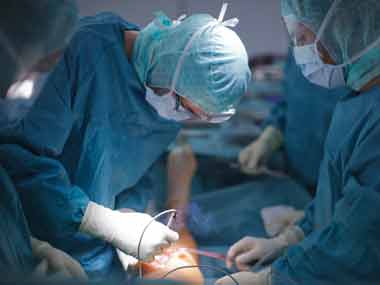Death in real time: Aiims patient’s death after live telecast of surgery revives debate

The death of a patient while being operated upon in one of the country’s premier institutions by a foreign surgeon has raised questions over the ethics of the entire procedure.
As part of a annual conference held in Delhi, over a 100 surgeons watched as a doctor from Japan performed a laparoscopic liver surgery on a 62-year-old labourer suffering from cirrhosis while assisted by an Indian doctor from AIIMS. And that’s when there was massive internal bleeding, reported the Times of India.
While there were suggestions that the remainder of the surgery should be conducted as an open surgery, the Japanese doctor who was conducting the surgery relented only after seven hours. The live feed was then terminated, the surgery completed and the labourer, Shobha Ram, was taken to the ICU, but passed away a little over an hour later, the report said.
Aiims released a statement in which it said that the bleeding was a known complication of the procedure and all measures had been taken to control it. However, the statement noted that because of his existing liver disease he didn’t do well and passed away, reported the Hindustan Times. The statement also said that the patient’s family had been kept informed of his condition after the surgery.
And while the Times report raised questions over the live telecast of the surgery and whether the patient’s consent had been taken for an audience to view it, a doctor from Aiims told Hindustan Times that live surgery had nothing to with the death.
The doctor said the death was primarily due to the patient’s existing condition and several experts had done everything possible to save his life and due diligence had been done before the surgery began.
Having an audience for a surgery is hardly new. As this detailed piece on live telecast by Slate noted, it’s been around since the first surgeries where an audience stood around to watch a surgeon and medical students are present in operation theatres to study techniques they’ve learnt about.
And this has become a lot easier in laparoscopic surgeries since the use of a camera is involved anyway, it becomes much easier. In May 2014, a UK surgeon operated and had the surgery telecast live through Google Glass, even as students and other doctors could ask him questions. The Telegraph report pointed out that 90 percent of the students who watched the live broadcast even wanted such telecasts to be part of the teaching process.
But as the Slate report pointed out, there have also been doubts raised over whether a surgeon should have the distraction of having to explain his procedure while carrying out the operation just so that the ‘entertainment’ value of the telecast is higher.
The report noted: “Although surgeons are ashamed to admit it, live telesurgery is more like NASCAR than baseball: We want to see the driver make the turn, but we’re also hoping for a wreck. Dr. Neeraj Kohli, a gynecologic surgeon at Brigham and Women’s Hospital in Boston, says surgeons ‘want to see someone screw up. They want to see that they aren’t the only ones who have complications.'”
A blog post in a site for physicians also pointed to the fact that past surveys of US physicians had shown that they weren’t in favour of surgeries on them being broadcast live. It questioned then whether it was right for them to subject their patients to it. And given they have the option of recording the surgery and then analysing it later, the question isn’t entirely wrong.
Dr Duke E. Cameron, who is chief of cardiac surgery at Johns Hopkins, in 2005 wrote a stinging piece against live broadcast of surgeries. He ended saying: “So make a video of your best operation (with your patient’s permission, of course). Review it, learn from it, edit it, narrate it, duplicate it and share it. Leave out the classical music. Better yet, include several other cases that illustrate other important lessons. But please don’t ask me to watch it live.”
In the case of the Aiims patient it still isn’t clear whether the patient was aware of the surgery being streamed live and while there’s no evidence that it may have had anything to do with his death, the question mark over just how much it did impact it won’t be erased just yet.